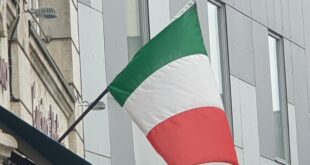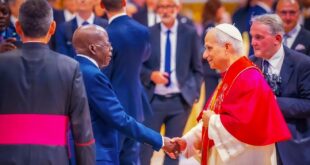Saturday, 29 June 2019 has gone down in history as the day citizens of an African country protested angrily in Europe against their visiting president to the notice of the international media.
About 250 Cameroonian exiles carried out a protest action in front of the luxurious InterContinental Hotel, where President Paul Biya and his wife were staying, in the Swiss city of Geneva.
The protesters gathered early on Saturday afternoon in a square near the European headquarters of the United Nations and near the hotel, waving Cameroonian flags and anti-Biya placards and posters. Some were singing: “How Many People Paul Biya Go Kill”.

“We Cameroonians demand that Cameroon enter the modern era of democracy, having lived for 37 years under the senile dictatorship of Paul Biya,” said Robert Wanto, head of the council for the Cameroonian Diaspora, who has been living in exile in France for almost 30 years. “This dictator has taken his habits to the InterContinental hotel where he’s squandering billions of our francs while the country is economically sick. We cannot accept it,” another protester said.
Some protesters also expressed their anger at the way the long-time leader has been managing the crisis in the English-speaking north-western and south-western regions of the country, which is taking a heavy toll on the civilian population. Hundreds of people have been killed in clashes between Cameroon’s security forces and activists in the regions since December 2016 and up to 50,000 have crossed the border to Nigeria to seek refuge.
When the crowd headed for the hotel, the considerable police presence around the hotel pushed them back with tear gas and water cannon. Luckily, nobody was injured or arrested, according to the police. However, a Swiss journalist was reportedly manhandled by some of President Biya’s personal security guards, who forcibly took his equipment while the he was filming. This was later returned to him after three hours of negotiations involving the Swiss police. The journalist had filed a complaint against the men involved.
The Cameroonians, who came from different parts of Europe, were obviously mobilised through social media by groups opposed to the Biya government.
Earlier in the week the Cameroonian embassy in Bern had warned that Cameroonians living in Europe were preparing for a “violent” demonstration in Switzerland on Saturday and warned them to desist from the action. The envoy’s warning was obviously not heeded.

Cameroon, led by 86-year-old Biya since 1982, has been grappling with the insurgency in the restive north-western and south-western parts of the country.
On Wednesday last week, Switzerland said it was acting as a facilitator in efforts to resolve the crisis by hosting a meeting of experts on how to help bring the conflict to an end. The Swiss foreign ministry, working with the Centre for Humanitarian Dialogue, said in a statement a day later that it was “committed to finding a peaceful, lasting negotiated solution to the crisis in north-western and south-western Cameroon”.
The aim of the three-day meeting which ended on Thursday was to prepare a framework for the future peace negotiations between the Cameroonian government and the political opposition.
“Switzerland has long been committed, both at bilateral and multilateral level, to finding a peaceful solution to the crisis and to promoting respect for human rights in Cameroon,” it said. “Switzerland is also committed to providing humanitarian aid to the affected local population and has supported Cameroon in dealing with multilingualism.”
Felix Dappah
 THE AFRICAN COURIER. Reporting Africa and its Diaspora! The African Courier is an international magazine published in Germany to report on Africa and the Diaspora African experience. The first issue of the bimonthly magazine appeared on the newsstands on 15 February 1998. The African Courier is a communication forum for European-African political, economic and cultural exchanges, and a voice for Africa in Europe.
THE AFRICAN COURIER. Reporting Africa and its Diaspora! The African Courier is an international magazine published in Germany to report on Africa and the Diaspora African experience. The first issue of the bimonthly magazine appeared on the newsstands on 15 February 1998. The African Courier is a communication forum for European-African political, economic and cultural exchanges, and a voice for Africa in Europe.






























